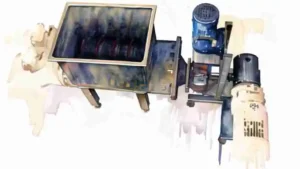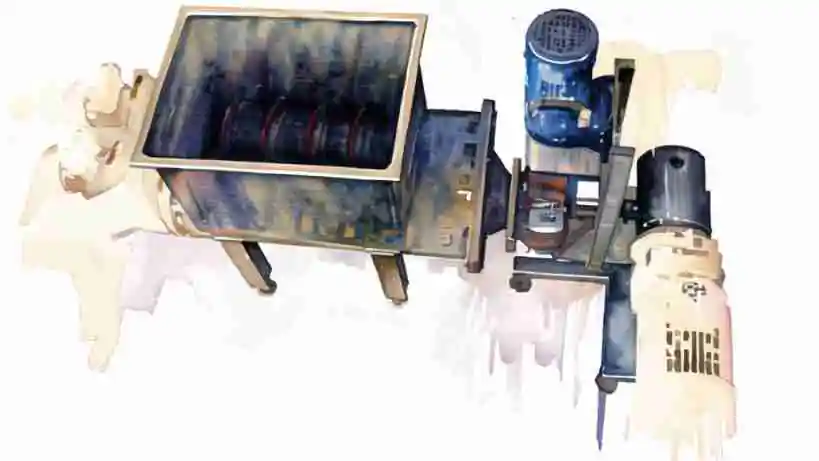The Rothenburg SERIES MJ 206 is a food waste wet waste disposal system specifically designed for the food industry. It’s ideal for restaurants, canteens, and food processing facilities.
How it Works:
- Waste Collection: Food waste is collected from various points within the facility and transported to a central storage tank via a vacuum suction system.
- Shredding and Homogenization: As the waste is transported, it undergoes a shredding process to reduce particle size and facilitate efficient storage. The shredded waste is then homogenized and liquefied to prevent solid matter from settling and clogging the system.
- Storage: The liquefied waste is stored in a tank, which can be customized in size to meet specific needs. The tank can be emptied periodically by a tanker truck.
Key Features:
- Modular Design: The system can be customized to fit various facility layouts and requirements.
- Multiple Feeding Stations: The system can accommodate multiple feeding stations, even if they are located in different areas of the facility.
- Efficient Waste Transport: The vacuum suction system ensures efficient and hygienic waste transportation.
- Space-Saving Design: The compact design minimizes the required floor space.
- Customizable Storage Tanks: Tanks can be sized to meet specific storage needs.
- Flexible Installation: The system can be installed above or below ground.
Important Note: The Rothenburg SERIES MJ 206 is designed for processing food waste generated within a specific facility. It is not intended for handling large volumes of source-separated organic waste from multiple locations. The system’s primary function is to efficiently collect, transport, and store food waste for later disposal or processing.
Rothenburg Food Industry Equipment is a recognized provider of advanced machinery tailored to the needs of the food preparation industry. Known for their reliable and efficient processing equipment, Rothenburg MJ206 has traditionally focused on solutions for food preparation and handling, catering to commercial kitchens, food processing plants, and large-scale catering services.
However, as environmental consciousness grows and regulations surrounding waste management tighten, many companies like Rothenburg in the industrial equipment space are expanding their offerings to include technology for organic waste processing. This article explores that Rothenburg MJ206 remains focused exclusively on the food preparation industry market.
Rothenburg MJ206’s Traditional Focus: Food Preparation and Handling
Rothenburg MJ206 has long been a trusted provider of food processing equipment aimed at handling, cutting, blending, and portioning tasks, specifically catering to commercial food preparation needs. The company’s equipment line includes:
- High-performance mixers and blenders: Designed for blending ingredients in bulk, suited to large kitchens and food production facilities.
- Precision cutters and slicers: Known for handling meats, vegetables, and other ingredients efficiently, with designs that meet the high standards of commercial food operations.
- Portioning and packaging equipment: Machines to help streamline food packaging, ensuring uniform portions, reducing food waste, and maintaining hygiene in handling.
These products are engineered to meet the demanding requirements of commercial food service operations, where efficiency, speed, and hygiene are paramount. Rothenburg MJ206 equipment is designed for heavy-duty performance, handling large quantities of food ingredients with minimal downtime.
Expansion into Organic Waste Processing: Current Market Trends
As waste management becomes a priority, industries that generate food waste are increasingly required to adopt sustainable waste processing technologies. The organic waste market presents a unique opportunity, especially for companies with expertise in food processing. Equipment tailored for organic waste must efficiently separate, dewater, or compost waste materials while reducing contamination and managing odors. In some cases, industrial food processing companies are adapting their technology for dual-use, extending their capabilities to handle post-consumer organic waste or waste from food preparation processes.
Rothenburg MJ206’s Offerings: Is there any Focus on General Organic Waste Processing?
Currently, Rothenburg MJ206’s product line remains heavily focused on food preparation and handling, with little evidence that the company has entered the organic waste processing sector. Their catalog includes equipment specifically for preparing food ingredients and does not mention machines designed for organic waste management or depackaging functions.
Several factors suggest that Rothenburg MJ206 is likely to remain focused on the food preparation market for the following reasons:
- Specialized Equipment Design: The machines Rothenburg6 produces are built for cutting, mixing, and preparing fresh food ingredients, without consideration for processing waste materials. Adapting such equipment to handle organic waste would likely require significant design changes, as waste handling demands unique considerations for durability, contamination resistance, and waste separation efficiency.
- Lack of Waste-Specific Features: Unlike organic waste processing equipment, Rothenburg MJ206 machines do not have features like dewatering systems, screw presses, or separation technologies essential for organic waste handling. Waste processing systems often need specialized filters, depackaging functions, and separation methods to manage different waste streams effectively, especially when handling materials with varying moisture content and contamination.
- Focus on Hygienic Design for Food Preparation: Rothenburg product design emphasizes hygiene and food safety, critical for direct food handling applications. However, waste processing demands a different approach, often including designs that tolerate contamination and facilitate easy cleaning and odor management, which may not align with Rothenburg MJ206’s design priorities for the food preparation industry.
Opportunities for Rothenburg MJ206 in Organic Waste Processing
While Rothenburg MJ206 currently lacks a specific line for organic waste processing, the growing demand for sustainable waste solutions in industries closely linked to food production suggests potential for future expansion. Many industrial food processors are now exploring options for onsite waste management systems, such as depackaging and organic material separation, to address both regulatory and sustainability demands. For Rothenburg MJ206, entering the organic waste market would entail adapting existing technologies or developing new machines equipped for the unique challenges of waste processing.
Key factors that could support a transition into organic waste processing include:
- Adaptation of Existing Food Processing Technology: With expertise in handling food products, Rothenburg MJ206 could leverage some of its existing cutting and mixing technology for applications in organic waste depackaging or pre-treatment.
- Growing Demand from Large Commercial Clients: As regulatory requirements shift, some of Rothenburg MJ206’s existing customers in the food industry may increasingly demand solutions for waste reduction and processing. Offering products that handle both food preparation and waste processing could add value to their current offerings.
- Potential Collaboration with Waste Processing Equipment Manufacturers: Rothenburg MJ206 could explore partnerships with companies specializing in waste processing technology, combining its food handling expertise with waste separation and depackaging technologies to offer a hybrid solution.
Conclusion

As it stands, Rothenburg, although offering the MJ206 system, remains committed to the food preparation industry, with no indication of equipment specifically designed for organic waste processing. Their current product line targets food handling and preparation, focusing on efficiency, speed, and hygiene in commercial kitchen and food processing environments.
However, the organic waste sector is ripe for expansion as regulations and sustainability goals drive demand for waste processing solutions within industries like food service and processing. For Rothenburg MJ206, future growth into this area would likely require substantial modifications to existing technology or the development of new equipment explicitly designed to manage the challenges unique to organic waste.
In summary, while Rothenburg MJ206 currently does not offer products designed for organic waste, its established position in the food processing industry provides a solid foundation should the company decide to explore the organic waste market in the future.
Manufacturer of industrial equipment
Industry Sector: Industrial Equipment
Business Location: Germany
Address:
Rothenburg GmbH
Am Harweh 7
24539 Neumünster
Germany
Phone: +49 4321 97780
Email: info@rothenburg-gmbh.de
Website:
Rothenburg: https://rothenburg-eco.com/en/products/series-mj-206
Opening Hours:
9am to 5pm Weekdays

